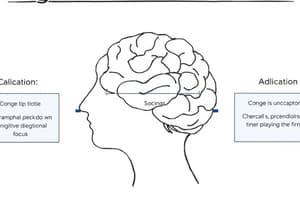Podcast
Questions and Answers
What is the main focus of Piaget's Formal Operational Stage?
What is the main focus of Piaget's Formal Operational Stage?
- Concrete examples only
- Abstract and logical thinking (correct)
- Moral dilemmas only
- Rationalizations and justifications
According to Erikson, what does his psychosocial theory emphasize?
According to Erikson, what does his psychosocial theory emphasize?
- Physical changes in adolescence
- Cognitive development stages
- Individual needs and society interaction (correct)
- Learning through play
Which of the following best describes the essence of Piaget's theory of cognitive development?
Which of the following best describes the essence of Piaget's theory of cognitive development?
- Static development with no progression
- Random changes in cognitive abilities
- Sequential stages building on prior understanding (correct)
- Dependence on external stimuli for growth
In Havighurst's developmental tasks approach, what is the emphasis placed on?
In Havighurst's developmental tasks approach, what is the emphasis placed on?
What is a key difference between Piaget's and Erikson's theories?
What is a key difference between Piaget's and Erikson's theories?
According to Erikson's psychosocial theory, what is the main focus of the stage 'Identity vs. Confusion'?
According to Erikson's psychosocial theory, what is the main focus of the stage 'Identity vs. Confusion'?
Which of the following is NOT one of the key tasks central to successful adolescent development according to Havighurst's theory?
Which of the following is NOT one of the key tasks central to successful adolescent development according to Havighurst's theory?
What is the consequence of successfully completing the 'Identity vs. Confusion' stage based on Erikson's theory?
What is the consequence of successfully completing the 'Identity vs. Confusion' stage based on Erikson's theory?
According to Piaget's theory of cognitive development, what is a key aspect of adolescent cognitive growth?
According to Piaget's theory of cognitive development, what is a key aspect of adolescent cognitive growth?
What happens if adolescents fail to complete the key tasks outlined in Havighurst's developmental task theory?
What happens if adolescents fail to complete the key tasks outlined in Havighurst's developmental task theory?
Study Notes
Understanding Adolescent Development Through Key Theories
Adolescence is a unique stage of life characterized by rapid physical changes, social growth, and cognitive maturation. To better understand this period, numerous psychologists have proposed theoretical frameworks explaining these transformations. In this article, we explore three influential theories—Piaget's concept of cognitive development, Erikson's perspective on psychosocial stages, and Havighurst's developmental tasks approach—to gain insight into how adolescents navigate their transition from childhood into young adulthood.
Piaget's Theory of Cognitive Development
Jean Piaget proposed that individuals progress through four sequential stages of cognitive development throughout their lives, with each phase building upon previous levels of understanding. For adolescents, Piaget emphasizes the Formal Operational Stage (ages 11–adult), where they begin to think abstractly and logically rather than relying solely on concrete examples, like those used during earlier cognitive phases. This newfound capacity allows teens to consider hypothetical situations and contemplate moral dilemmas more critically yet may also lead them to engage in rationalizations and justifications that do not always align with reality.
Erikson's Psychosocial Theory
Erik Erikson introduced his eight-stage model of human psycho-social development, which focuses specifically on the interplay between individual needs and society itself. During adolescence, Erikson places emphasis on Identity vs. Confusion, suggesting that this stage requires teenagers to establish themselves outside of their families while forming a clear sense of who they are within the broader context of societal norms, expectations, and values. Successful completion of this stage results in a strong and positive self-identity; failure leads to feelings of confusion and concern over one's personal role in the world.
Havighurst's Developmental Task Theory
Paul H. Havighurst created an age-specific list of common challenges facing children and youth at various developmental milestones. His work on adolescent development highlights six key tasks central to growing up successfully, including developing autonomy, establishing relationships with peers, demonstrating competency in school subjects, and exploring sexuality. By addressing these demands, adolescents can learn valuable skills needed to become independent, empathetic adults capable of navigating complex social situations. Failure to complete these tasks may result in delays in reaching important developmental goals required for later successes.
In conclusion, these theories reveal aspects integral to our comprehension of adolescent development. Each provides a unique lens through which we might view this fascinating transitional period. As psychology continues to evolve, so too will our knowledge about the complexity inherent in nurturing healthy adolescents whose strengths empower them to move forward confidently despite the many obstacles that await them along life's pathway.
Studying That Suits You
Use AI to generate personalized quizzes and flashcards to suit your learning preferences.
Description
Explore Piaget's Cognitive Development Theory, Erikson's Psychosocial Theory, and Havighurst's Developmental Task Theory to gain insight into the cognitive, social, and emotional development of adolescents. Learn about the key concepts and stages proposed by these influential psychologists.




